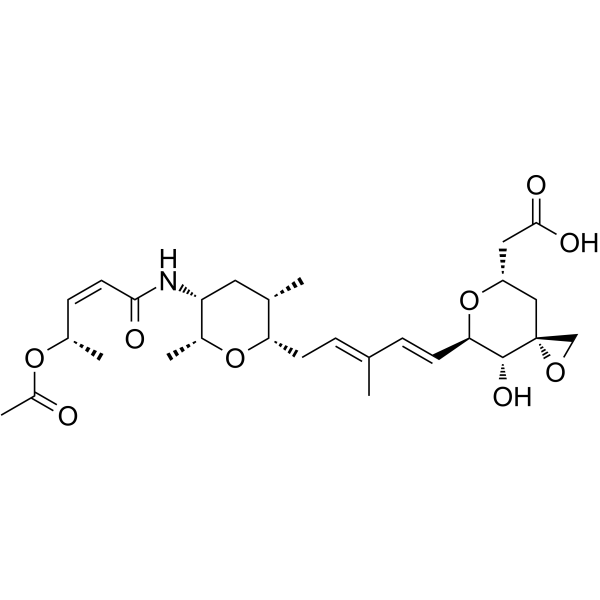
Thailanstatin A
CAS No. 1426953-21-0
Thailanstatin A ( —— )
产品货号. M28204 CAS No. 1426953-21-0
Thailanstatin A 是一种超强效的真核 RNA 剪接抑制剂 ( IC 50 =650 nM)。
纯度: >98% (HPLC)
 COA
COA
 Datasheet
Datasheet
 HNMR
HNMR
 HPLC
HPLC
 MSDS
MSDS
 Handing Instructions
Handing Instructions
| 规格 | 价格/人民币 | 库存 | 数量 |
| 2MG | ¥2649 | 有现货 |


|
| 5MG | ¥4690 | 有现货 |


|
| 10MG | ¥6715 | 有现货 |


|
| 25MG | ¥10287 | 有现货 |


|
| 100MG | 获取报价 | 有现货 |


|
| 200MG | 获取报价 | 有现货 |


|
| 500MG | 获取报价 | 有现货 |


|
| 1G | 获取报价 | 有现货 |


|
生物学信息
-
产品名称Thailanstatin A
-
注意事项本公司产品仅用于科研实验,不得用于人体或动物的临床与诊断
-
产品简述Thailanstatin A 是一种超强效的真核 RNA 剪接抑制剂 ( IC 50 =650 nM)。
-
产品描述Thailanstatin A is an ultra-potent inhibitor of eukaryotic RNA splicing ( IC 50 =650 nM). Thailanstatin A exerts effects via non-covalent binding to the SF3b subunit of the U2 snRNA subcomplex of the spliceosome and shows low-nM to sub-nM IC 50 s against multiple cancer cell lines. Thailanstatin A, a payload for ADCs, is conjugated to the lysines on trastuzumab yielding “linker-less” ADC .(In Vitro):Thailanstatin A (TST-A) is a potent antiproliferative natural product discovered by our group from Burkholderia thailandensis MSMB43 . Thailanstatin A (DU-145, NCI-H232A, MDA-MB-231 and SKOV-3 cells) exhibits potent antiproliferative activities with GI 50 s in the single nM range (1.11-2.69 nM) .
-
体外实验——
-
体内实验——
-
同义词——
-
通路Others
-
靶点Other Targets
-
受体AChR|Antifection|COX-2|PPAR
-
研究领域——
-
适应症——
化学信息
-
CAS Number1426953-21-0
-
分子量535.63
-
分子式C28H41NO9
-
纯度>98% (HPLC)
-
溶解度In Vitro:?DMSO : 250 mg/mL (466.74 mM)
-
SMILESC[C@@H](/C=C\C(N[C@H]1[C@@H](C)O[C@@H](C/C=C(\C)/C=C/[C@H]([C@H]2O)O[C@H](CC(O)=O)C[C@]22OC2)[C@@H](C)C1)=O)OC(C)=O
-
化学全称——
运输与储存
-
储存条件(-20℃)
-
运输条件With Ice Pack
-
稳定性≥ 2 years
参考文献
1.Bourjot M, et al. Chemical constituents of Anacolosa pervilleana and their antiviral activities. Fitoterapia. 2012 Sep;83(6):1076-80.
产品手册




关联产品
-
p-O-Farnesylcoumaric...
p-O-Farnesylcoumaric acid
-
N-Acetyl-L-arginine ...
N-α-乙酰精氨酸是一种胍基化合物, 是一种内源性代谢产物。
-
(S)-(+)-2-Octanol
(S)-(+)-2-Octanol is the S-enantiomer of octan-2-ol. Octan-2-ol is involved in the production of nanomaterials and liquid crystal materials.



 021-51111890
021-51111890 购物车()
购物车()
 sales@molnova.cn
sales@molnova.cn







